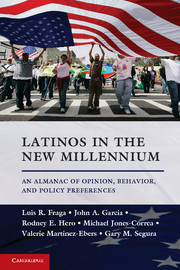Book contents
- Frontmatter
- Contents
- Acknowledgments
- 1 Latinos in the New Millennium
- 2 A Demographic Profile of Latinos in the United States
- 3 Core Values
- 4 Latino Identities
- 5 Latino Transnationalism
- 6 Intergroup Relations
- 7 Civic Engagement
- 8 Latino Media and Technology Usage
- 9 Voter Registration, Turnout, and Choice
- 10 Evolving Patterns and Preferences in Latino Partisanship
- 11 Latinos and Gender Role Attitudes
- 12 Latino Issues and Policy Preferences
- 13 Hope and Reality in Latino Educational Attainment
- 14 Latinos and the Future of American Politics
- Index
- References
13 - Hope and Reality in Latino Educational Attainment
Published online by Cambridge University Press: 05 June 2012
- Frontmatter
- Contents
- Acknowledgments
- 1 Latinos in the New Millennium
- 2 A Demographic Profile of Latinos in the United States
- 3 Core Values
- 4 Latino Identities
- 5 Latino Transnationalism
- 6 Intergroup Relations
- 7 Civic Engagement
- 8 Latino Media and Technology Usage
- 9 Voter Registration, Turnout, and Choice
- 10 Evolving Patterns and Preferences in Latino Partisanship
- 11 Latinos and Gender Role Attitudes
- 12 Latino Issues and Policy Preferences
- 13 Hope and Reality in Latino Educational Attainment
- 14 Latinos and the Future of American Politics
- Index
- References
Summary
Latinos have long identified the education of their children as one of the most important policy challenges confronting their communities. Improving the educational attainment of Mexican Americans and Mexican immigrants was a primary goal of the League of United Latin American Citizens when it was established in 1929. This organization argued that communities needed to value formal education as a necessary resource to limit discrimination and promote their civil rights (Marquez 1993). Latino leaders and organizations were at the forefront of challenging the de jure segregation of Mexican and Mexican American children in California and Texas in the 1930s and 1940s that led to the dismantling of so-called Mexican schools in much of the southwestern United States (San Miguel 1987). More recently, Latinos challenged the de facto segregation of their children in the Southwest by filing lawsuits such as Cisneros v. Corpus Christi Independent School District (1970) and Keyes v. School District No. 1, Denver, Colorado (1973). The federal court decisions that followed determined that Mexican American and Mexican schoolchildren had histories of enrollment segregation that contributed to limited educational opportunities and low educational attainment more similar to the experiences of African Americans than to those of Caucasians.
It should not be surprising, therefore, that education ranks highly in recent polls that ask Latinos to list the policy issues of greatest concern to their communities. A survey conducted in 2004 found that when Latino respondents were asked, “What do you think is the most important issue to you and your family today – education, jobs and the economy, health care, terrorism, or immigration?” approximately 26 percent listed education as the most important issue. It was listed second only to jobs and the economy (Bendixen and Associates 2004). Also in 2004, a Pew Hispanic Center survey of Latino registered voters education was listed by 54 percent of respondents as the issue that was most likely to determine whom they would support for president. Results from our 2006 Latino National Survey (LNS) reveal that when respondents were asked, “What is the most important problem facing the Latino community today?” education ranked third at 9 percent, behind immigration at 30 percent and unemployment and jobs at 12 percent.
- Type
- Chapter
- Information
- Latinos in the New MillenniumAn Almanac of Opinion, Behavior, and Policy Preferences, pp. 386 - 405Publisher: Cambridge University PressPrint publication year: 2011



